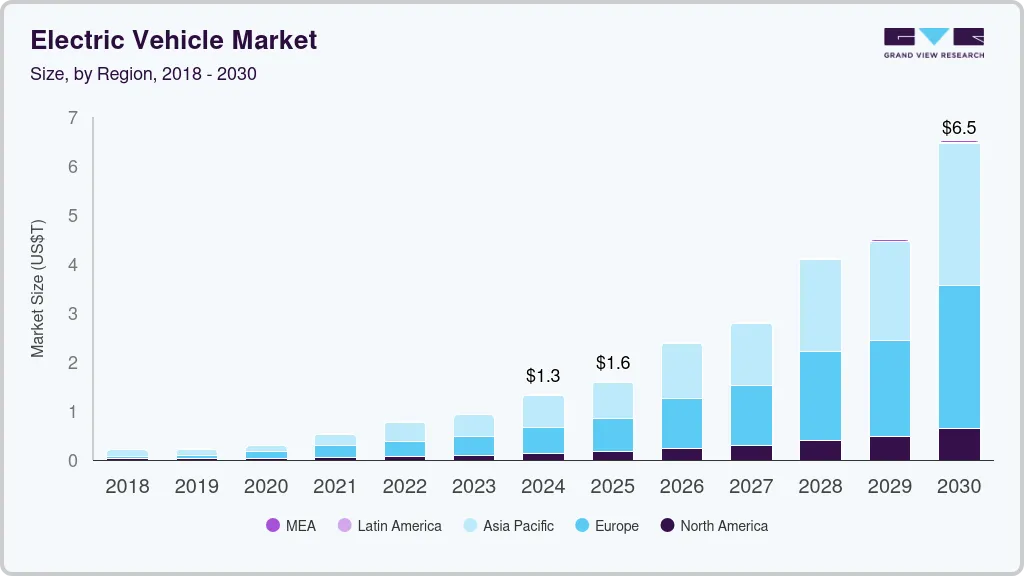The global electric vehicle market was valued at USD 1,328.08 billion in 2024 and is expected to reach USD 6,523.97 billion by 2030, expanding at a CAGR of 32.5% between 2025 and 2030. The increasing adoption of electric vehicles (EVs) is being driven by favorable government initiatives and regulatory policies worldwide. Many nations are enforcing strict emissions norms and offering a range of incentives such as subsidies, tax rebates, and benefits to both manufacturers and consumers, thereby accelerating the transition from traditional internal combustion engine (ICE) vehicles to electric mobility solutions.
Breakthroughs in battery technology are playing a pivotal role in making EVs more viable and attractive. Innovations like solid-state batteries and advancements in lithium-ion technologies are enhancing energy density while bringing down overall costs and charging times. These developments are significantly improving EV range, performance, and affordability, thus fueling consumer interest and market penetration.

The convergence of affordability, technological innovation, and performance efficiency is catalyzing rapid EV market growth. Advances in battery chemistry have shortened charging times and increased vehicle range, making EVs a more practical and appealing option. Falling battery prices—driven by economies of scale and improved manufacturing processes—have improved cost competitiveness with ICE vehicles. In addition, enhanced performance features such as quicker acceleration, longer driving ranges, and smoother handling are making EVs more desirable. Coupled with increasing environmental awareness and proactive government support, these trends are ushering in a major shift in the global automotive landscape.
Key Market Insights:
- Regional Insight: Asia Pacific emerged as a promising region for electric vehicles in 2024. The growth is attributed to rapid advancements in EV infrastructure development across the region.
- By Vehicle Type: Passenger cars held the largest share of 89.0% in 2024. The segment is expected to see continued growth as consumer adoption rises in major automotive markets.
- By Drive Type: The Front-Wheel Drive (FWD) segment led the market in 2024. Its increasing adoption is due to lower manufacturing costs and simpler design requirements compared to Rear-Wheel Drive systems.
- By Vehicle Speed: Vehicles within the 100MPH–125MPH speed range dominated the segment in 2024. Demand for high-speed electric cars, as well as two- and three-wheelers, is contributing to this growth.
- By End-Use: The personal use segment led the market in 2024. Emission-free personal EVs offer a cleaner alternative to gasoline-powered vehicles, resonating with environmentally conscious consumers.
Order a free sample PDF of the Electric Vehicle Market Intelligence Study, published by Grand View Research.
Market Size & Forecast
- 2024 Market Size: USD 1,328.08 Billion
- 2030 Projected Market Size: USD 6,523.97 Billion
- CAGR (2025-2030): 32.5%
- Asia Pacific: Largest market in 2024
Key Companies & Market Share Insights
Several prominent companies are driving innovation and competition in the electric vehicle (EV) sector, including AB Volvo, Volkswagen Group, BYD Company Ltd., among others. To strengthen their market presence and retain a competitive edge, these organizations are increasingly incorporating advanced technologies into their EV portfolios. In line with this, key players are actively engaging in strategic initiatives such as product launches, business expansions, partnerships, collaborations, and strategic agreements.
AB Volvo is a globally recognized manufacturer specializing in commercial vehicles such as trucks, buses, and construction equipment. Operating through segments like Volvo Trucks, Volvo Buses, and Volvo Construction Equipment, the company offers dependable and forward-thinking transportation solutions worldwide. Volvo has demonstrated a strong commitment to sustainability, leading the way in the development of electric and autonomous vehicles aimed at significantly lowering emissions across its product range.
Volkswagen Group has emerged as a key contender in the EV market, driven by its focus on sustainable transportation. The company’s ID. series—including models like the ID.3 and ID.4—exemplifies its bold strategy to lead the global shift toward electrification. Backed by substantial investments in battery technology, production facilities, and charging infrastructure, Volkswagen is accelerating its EV transition. Its extensive brand portfolio—including Audi, Porsche, and Škoda—is continuously expanding its electric lineup, offering innovative, high-performance, and environmentally conscious vehicles that cater to a broad range of consumers and markets.
Key Players
- BYD Company Ltd.
- Ford Motor Company
- General Motors
- Honda Motor Co., Ltd.
- Kawasaki Motors Corp., U.S.A
- Mercedes-Benz Group AG
- Mitsubishi Motors Corporation
- Nissan Motor Co., Ltd.
- Renault Group
- Tesla, Inc.
- Toyota Motor Corporation
- Volkswagen Group
- Zero Motorcycle
Explore Horizon Databook – The world's most expansive market intelligence platform developed by Grand View Research.
Conclusion
The Electric Vehicles (EV) market is undergoing a period of significant expansion, driven by supportive government policies and continuous advancements in battery technology. The Asia Pacific region has a leading position in the market, while North America is also expected to show notable growth. The market is largely dominated by battery electric vehicles and passenger cars. Leading companies in the sector are prioritizing the integration of advanced technologies and strategic initiatives to maintain their competitive edge.






